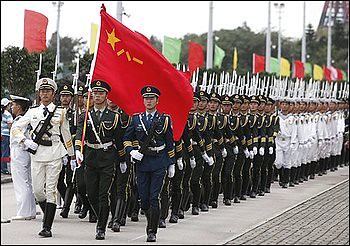
Chinese People's Liberation Army (PLA) personnel parade during the open day of Stonecutter Island Navy Base in Hong Kong Saturday, March 6, 2010., a photo by Pan-African News Wire File Photos on Flickr.
China blasts U.S. for sending 'wrong message' on South China Sea disputes
By the CNN Wire Staff
updated 12:02 AM EDT, Sun August 5, 2012
(CNN) -- China blasted the United States on Saturday for its recent public criticism and urging of diplomacy to address territorial disputes in the South China Sea, saying the U.S. statement shows "total disregard for the facts" and sends "a seriously wrong message."
The blistering statement, from Chinese foreign ministry spokesman Qin Gang, follows one issued the previous day by a counterpart at the U.S. State Department.
The debate revolves around who controls islands and waters in the South China Sea. Countries such as Vietnam and the Philippines lay claim to some areas. Qin stated unequivocally Saturday that "China has indisputable sovereignty over the South China Sea and adjacent waters."
Acting U.S. State Department deputy spokesman Patrick Ventrell began his statement Friday insisting the United States does "not take a position on competing territorial claims ... and (has) no territorial ambitions in the South China Sea."
Yet he added that Washington believes countries "should work collaboratively and diplomatically to resolve disputes without coercion, without intimidation, without threats and without the use of force."
Ventrell suggested that not all nations in the region are taking this latter approach, expressing U.S. concern about the "increase in tensions in the South China Sea" in the form of "confrontational rhetoric," "coercive economic actions and the incidents around the Scarborough Reef, including the use of barriers to deny access."
"In particular, China's upgrading of the administrative level of Sansha City and establishment of a new military garrison there covering disputed areas of the South China Sea run counter to collaborative diplomatic efforts to resolve differences and risk further escalating tensions in the region," Ventrell said, before urging the nations involved to agree on ways to peacefully address disputes.
Qin, the Chinese foreign ministry spokesman, started his statement -- which was posted on his ministry's website -- by accusing the United States of confounding "right and wrong" and undermining regional efforts to "uphold peace and stability in the South China Sea and the Asia-Pacific region at large."
China's action in Sansha City, specifically, is a "necessary adjustment" that falls "well within China's sovereign rights," the spokesman said.
Qin accused other nations of not abiding by a 2002 agreement involving Association of Southeast Asian Nations, or ASEAN, members.
The Chinese spokesman then singled out Washington for what he suggested was hypocrisy and "unfounded accusations ... against China's normal and reasonable acts."
"People cannot but question the true intention of the U.S. side," Qin wrote.
He challenged the United States for overlooking other nations "marking out a large number of oil and gas blocks in the South China Sea" and claiming "as its own China's islands, reefs and waters."
Washington, too, has ignored it when other nation's navies have threatened Chinese fishermen, Qin claimed.
If the United States truly wasn't taking positions on territorial disputes, then why did it speak up now and "stir up trouble at a time when countries concerned in the region are stepping up dialogue?" he asked rhetorically.
"The United States needs to follow the trend of the times and respect the shared aspirations and consensus of countries in the region for peace, stability and development," Qin said. "It should respect China's sovereignty and territorial integrity, and act in a way that contributes to stability and prosperity of the Asia-Pacific and not otherwise."
No comments:
Post a Comment